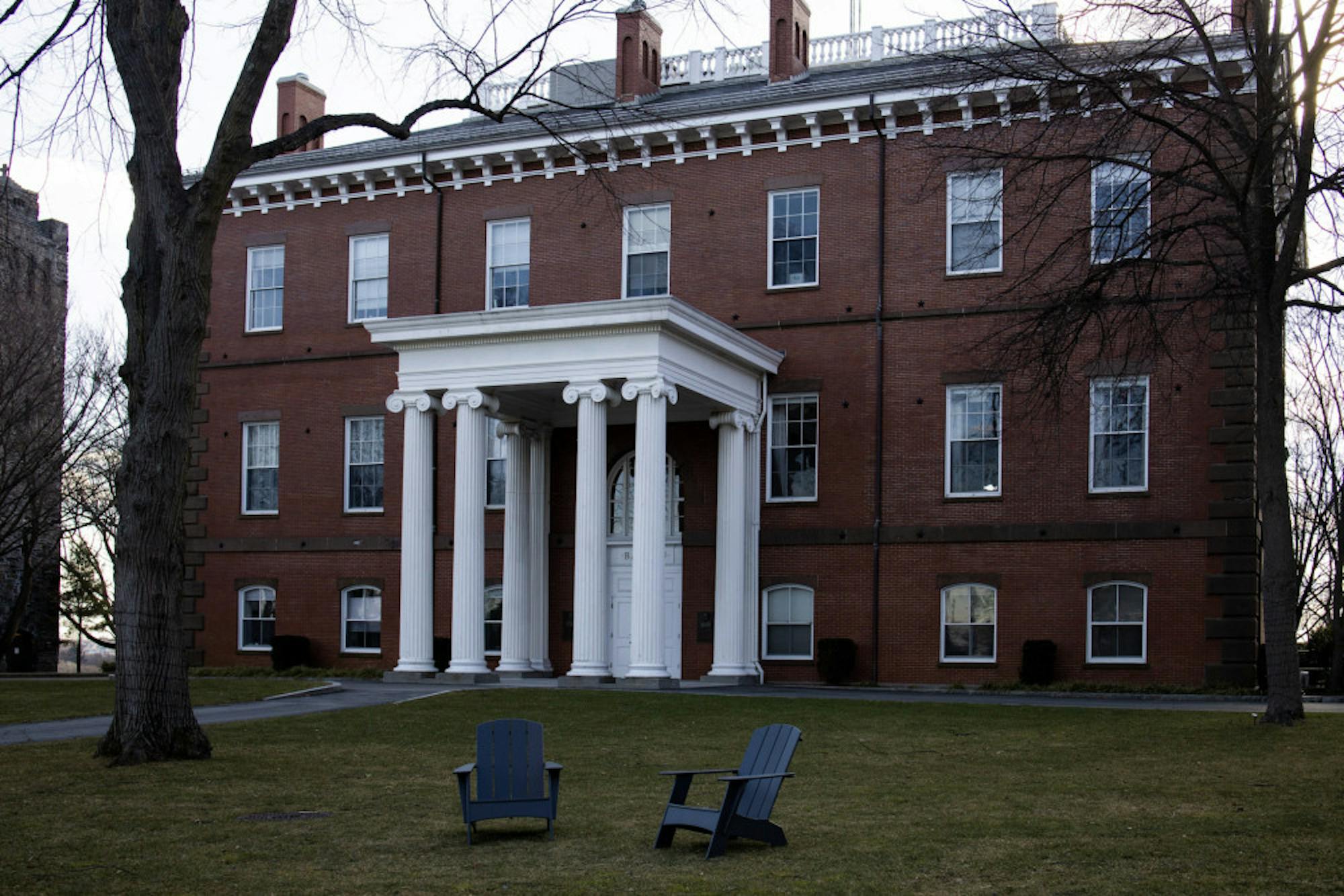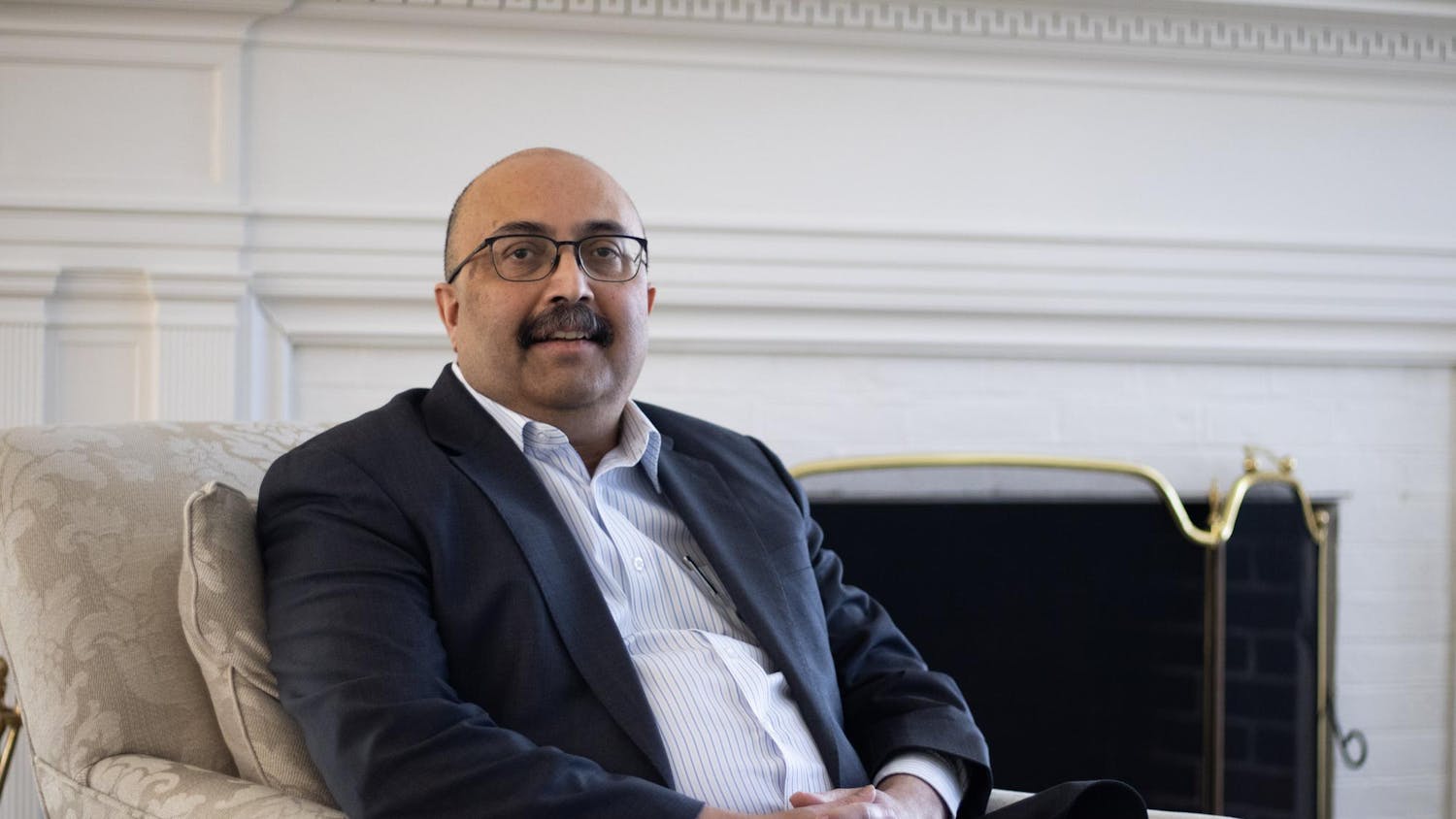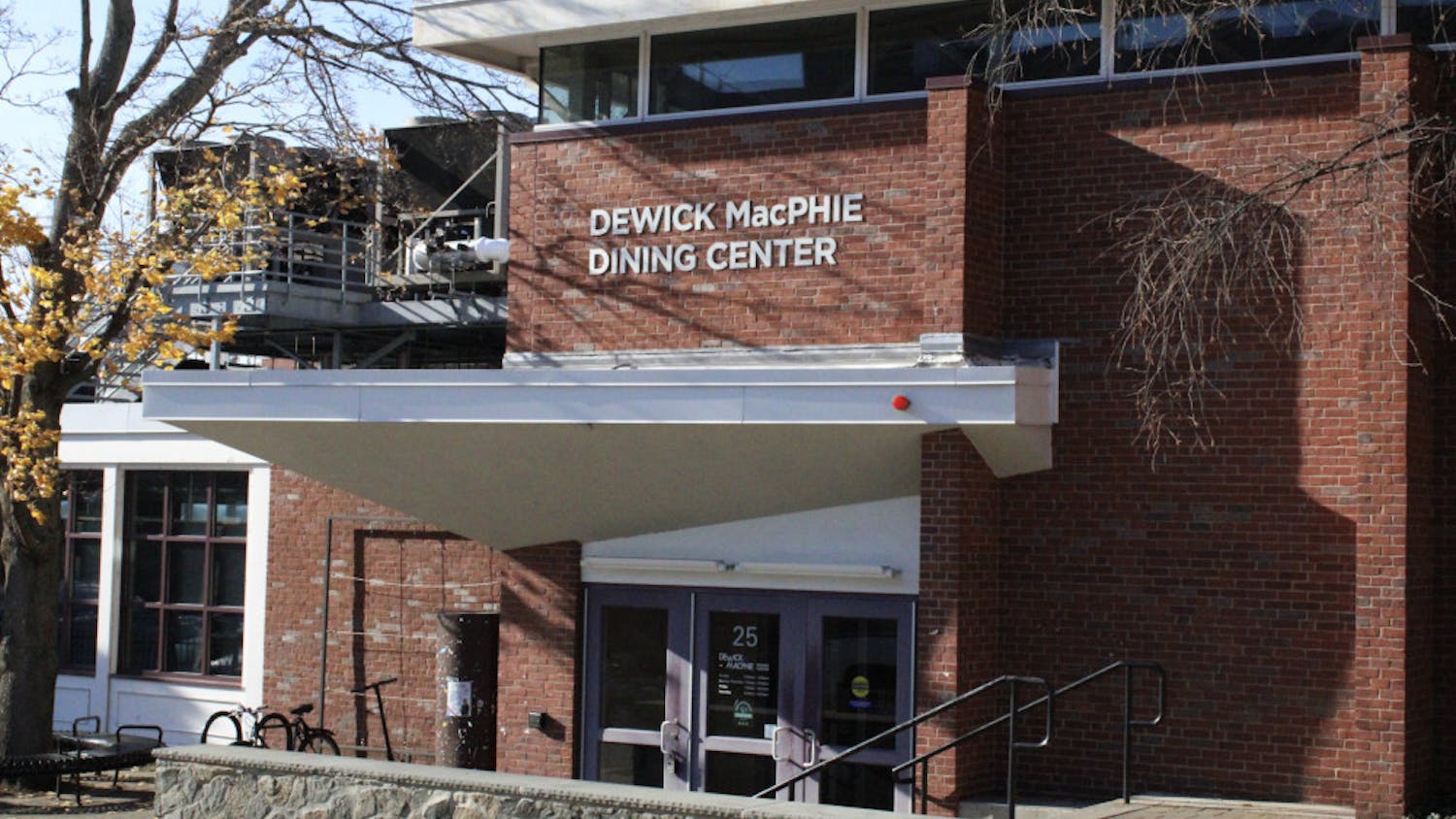When Caroline Genco became provost ad interim of Tufts in January, one former employee of the Office of Diversity, Equity, Inclusion, and Justice knew they couldn’t stay at the university.
The Office of DEIJ, housed under the Office of the Provost, has seen significant changes since the beginning of the year. Tufts’ two chief diversity officers (CDOs), Rob Mack and Joyce Sackey, both left their positions in August within a span of two weeks. Internal conflict over the university’s Juneteenth programming and a decision by Genco to temporarily change the reporting structure of the DEIJ office caused former and current employees to allege a lack of transparency in the provost’s office and a culture that runs contrary to the university’s anti-racism principles.
Following the announcement of Mack and Sackey’s departures, S. Rae Peoples, an associate director of diversity and inclusion education, wrote to University President Anthony Monaco on Aug. 8 to request that the university not recruit or hire anyone to fill the VP for DEIJ position, citing “deep concerns with the Office of the Provost operating as ‘business as usual’ by moving forward with recruitment and hiring practices for these positions during a time that is profoundly unusual, given the current tumultuous and unstable state of the Office of the Provost.” Peoples, who is currently on personal leave, referenced her experiences and observations from working in the DEIJ office with Genco as what prompted her to write the email. Rae subsequently provided this email and other relevant documents to the Daily.
“If members of senior leadership for Tufts are either unwilling or incapable of practicing anti-racist values consistently, then how are we expecting our students, staff, faculty, and support employee members to uphold these values?” Peoples asked in the email.
Monaco responded to these allegations in an email to the Daily.
“Advancing the university’s commitments to being an anti-racist university continues to be a top priority for me,” Monaco wrote. “I remain supportive of Provost Genco’s plans to introduce the structure and resources needed for continued progress on our DEIJ goals.”
Mack and Sackey’s departures were initially announced to faculty and staff, but not students, in an email from Genco on July 27 in which she thanked them for building “a tremendous framework for the important work that lies ahead of us.” Sackey, who started at Tufts in 2009, now serves as the inaugural chief diversity and inclusion officer at Stanford Medicine. Mack, who joined the Tufts community in 2012, is now the vice provost for student success and engagement at The New School. The university is not planning to fill their positions until it hires a vice provost for diversity, equity, inclusion, and justice.
“With both Joyce and Rob departing, it is important for me to state unequivocally that the senior team's commitment to diversity, equity, inclusion, and justice is steadfast and unwavering,” Genco wrote in the July email. “Our commitment is demonstrated by, among other things, the creation of a new senior level position, the vice provost for diversity, equity, inclusion, and justice.”
In the months leading up to Genco becoming provost ad interim, she and Executive Vice President Mike Howard co-led an external review of the provost’s office and recommended the creation of the vice provost for DEIJ position. The university is in the process of interviewing finalists for that role.
“The goal will be that when that new person starts, they will engage the community to try to understand what we need to do in the DEIJ space,” Genco said in an interview with the Daily.
The first incident that Peoples highlighted in her email to Monaco took place in January, when she and the former employee — who spoke to the Daily on the condition of anonymity — were present during Genco’s first meeting with the CDOs and the CDO team. When one of the former CDOs voiced a criticism of Monaco’s approach to DEIJ education at Tufts, Genco allegedly told the CDO that “no one goes against the president.” Genco declined to comment on this conversation.
This January meeting wasn’t the only instance that made the former employee feel uneasy. They allege that after the first few weeks of Genco being in office, she stopped meeting with the CDOs as a group and they were pulled from certain committees they had previously served on.
The Juneteenth Planning Committee
A month after Genco started as provost, the university’s Juneteenth Planning Committee convened, with Peoples as the chair. The committee included Black and African American representatives from across the university.
Later in the year, on May 3, the committee submitted a resolution to the two CDOs asking them to pause the university’s Juneteenth programming. The resolution listed concerns about whether the Black community at Tufts had directly requested that the holiday be observed, and questioned whether half a day of programming honored the “spirit and intent” of Juneteenth at an institution where the majority of faculty are white, explaining that “the racial and power dynamics [are] particularly antithetical to the purpose of Juneteenth.”
The committee also pointed to “recent institutional developments that speak to the continued struggle for Tufts University to engage in anti-racist work in ways that shift and transform institutional culture and climate.”
The committee members extended an invitation to leadership for a conversation on the subject. A week later, on May 9, Genco met with the committee. She brought with her Kim Ryan, Tufts’ vice president of human resources. Mack and Sackey also joined the meeting.
Ryan explained in an email to the Daily that she was asked to attend the meeting by Genco “to provide context and address questions raised by the committee about how Tufts came to recognize Juneteenth as a University holiday prior to the establishment of a national holiday.”
Peoples noted in her August email to Monaco that “it is reasonable for a person to conclude that the insertion of the VP of HR at this meeting was a tactical approach to intimidate and was a posturing of power over the Committee.”
Following Genco’s meeting with the committee, Peoples emailed the two CDOs to report how the meeting unfolded.
“Several committee members were deeply concerned and offended by the way the conversation transpired,” Peoples wrote. “Words and sentiments that were used by committee members to describe the meeting today include: Disheartening, scolding, thrashing, and frightening. A statement was made that spoke to concerns with not being able to sleep tonight given what the individual had witnessed in the meeting.”
It was during this meeting that a senior member of leadership allegedly told the committee that “Juneteenth is Tufts now,” according to Peoples’ email. Peoples interpreted this as a suggestion that Tufts would co-opt a holiday for Black Americans as part of its own efforts to appear anti-racist. She went on to say that some committee members stopped attending meetings following this event.
Ultimately, the university did commemorate Juneteenth programming in a ceremony that featured remarks from Monaco, Genco, the two CDOs, Peoples and Lisa Fenn, director of DEI programming. Dr. Jelani Cobb, the dean of the Columbia Journalism School who writes about race and justice for the New Yorker, gave the keynote address.
“It is okay for us to acknowledge both that Juneteenth was a beautiful community event this year, and that the initial collective decision by the Committee [to pause programming this year] was rejected by senior leadership,” Peoples wrote in her email to Monaco.
Changing the DEIJ Office’s reporting structure
On July 11, Genco announced an interim reporting change within the DEIJ Office to the CDOs and the CDO team one by one in a series of meetings.
For years, the office was structured so that each CDO oversaw two associate directors of diversity and inclusion education (ADs). The CDOs ran committees and led DEIJ programming efforts at the university. Following the reporting change, they were stripped of that work and instead directed to work on DEIJ strategy, with one CDO assigned to focus on faculty and the other on students. The CDOs and their team were not involved in this decision.
“The reasons that I made the changes are confidential, and they're based on information that I gathered starting in March of 2022,” Genco told the Daily. “I think what we've learned over the last eight months is [that] sometimes the structure didn't work so well.”
Alongside the reporting change, Genco created the Director of DEI Programming position, which Fenn now holds. Fenn arrived at Tufts in Nov. 2021 and previously served as the program director of the university’s anti-racism initiative. (Fenn came to Tufts after nearly 15 years as an executive diversity and inclusion consultant and cited her “lived experience as a descendant of those enslaved in this nation” as part of her background in DEIJ.) The ADs began reporting to Fenn instead of the CDOs, and Fenn reported to Kara Charmanski, the executive associate provost for strategy and operations for the provost’s office. Genco subsequently revised this reporting structure based on employee feedback so that Fenn would report directly to her.
The CDOs and their team were told by Genco not to discuss the changes with anyone, which the provost explained was a typical request when making significant organizational announcements, noting that there was a plan to inform stakeholders at the appropriate time.
Less than a week after the reporting change went into effect, Peoples emailed Lisa Fenn to inform her of her intent to take a personal leave, Cc’ing Monaco, Genco and other administrators involved in university DEI efforts. She singled out the reporting change as an example of a “severely problematic and unstable” work environment and took issue with the CDOs losing certain operational responsibilities, such as leading committees; the fact that they would no longer supervise the ADs; the creation of the Director of DEI Programming position; and Charmanski’s role in the chain of command.
Charmanski declined to comment, but Genco stressed that Charmanski’s role was to “provide operational guidance and support to Lisa Fenn and the CDO team,” not to oversee DEIJ work. Peoples also highlighted how although the change was presented as interim, she was not aware of any planned end date for it.
“Both the exclusionary decision-making process and the authoritative communication approach that was used to relay the restructure is fundamentally antithetical to the practice and values of anti-racist work that Tufts has committed itself to,” Peoples wrote in her notice of personal leave. She explained to the Daily that during her meetings with Fenn, Genco and Ryan, she felt that no one provided a communication plan to inform the associate deans of diversity and inclusion (ADDIs), who work closely with the CDO team, of the change.
Genco emphasized that although she is the one with final decision-making authority in the Office of the Provost, she considers input from important stakeholders before reaching a decision.
“Not everyone is always in agreement with the decision … but it’s important to acknowledge that decisions are made, there’s a reason for the timing of how they are shared, and a need to move forward in the work to support them,” Genco wrote in a message to the Daily.
“The way that my conversations with … you and the provost ad interim … and institutional leadership (VP of HR) illustrate how institutional modes of communication, including attempts to silence employees and invitations to step into conversations as a means to contain and cajole people, simultaneously reinforce, and reproduce harmful and toxic working and learning environments,” Peoples wrote to Fenn in her notice of leave.
Although the anonymous former employee knew in January that they did not support Genco’s leadership style, they decided to leave Tufts after she announced the reporting change to the team — before they had secured their next job. They concurred with Peoples’ interpretation of the recent changes.
“For me, it was like, ‘You’re ad interim and you are making a lot of very big, significant changes,’” the former employee said of Genco. They referred to the dismantling of the Institute for Global Leadership, which was announced to the Tufts community on the same day Peoples put in her notice of personal leave. “We're not being consulted or talked to. There's no transparency. There's no opportunity … I felt early on that it's just not my comfort space.”
Fenn, who told the Daily her most immediate goal in her new job is navigating this interim reporting change period, wrote to the Daily: “I know that these efforts are not easy and the challenges we’re facing are not unusual. I can also say that this prior experience leads me to appreciate Provost Genco’s commitment to this work and her willingness to make difficult decisions to move it forward.”
The fall semester begins
The departures of the CDOs were announced, albeit without naming either Sackey or Mack, to the wider Tufts community in a Sept. 9 email from Genco that also included other DEIJ updates.
Genco stated in the email that she is mindful that the transitions and departures create questions about the university’s commitment to and ability to sustain DEIJ work.
“We recognize that we are not where we want to be, but we remain committed to getting there, and to keeping you updated in the process,” Genco wrote. “Our intention is not to suggest there is an immediate solution to the complex issues we grapple with daily, but to provide updates and clarity on current and future steps we are taking to reach our collective goals.”
She referred to the search for the VP for DEIJ, the CDO team, the ADs and her strengthened partnership with the ADDIs.
“As the academic year begins, our community is inundated with internal and external conditions that will challenge our resolve to uphold our DEIJ commitment,” Peoples wrote to the Daily in response to Genco’s email. “Beyond issuing periodic updates, we must move in a way that establishes our DEIJ initiatives in meaningful and sustainable ways.”
Shortly after Peoples asked Monaco not to fill the VP of DEIJ position immediately, the academic year began with one third of the positions in the DEIJ office empty and with Peoples still on personal leave.
Correction: A previous version of this article incorrectly attributed the quote from Provost Genco beginning with “We recognize that we are not where we want to be, but we remain committed to getting there…” to a statement she made to the Daily. Genco wrote this in a message to the entire Tufts community. A previous version also stated that the academic year began with “one third fewer positions filled in the DEIJ office.” One third of the positions are empty, but one position is new and therefore was never filled to begin with. The Daily regrets these errors.






